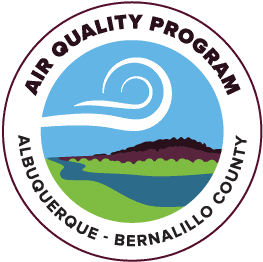
Tips to Reduce Ozone as the Season Heats Up
Everyone plays a role in ozone reduction to improve public health
June 12, 2023
Ahead of the hot summer months, the City of Albuquerque-Bernalillo County Air Quality Program, administered by the City’s Environmental Health Department, offers tips to reduce ground level ozone. Ground-Level Ozone (O3) is an invisible pollutant that threatens local air quality. Ozone levels are typically highest during the afternoon hours of the summer months, when the influence of direct sunlight is the greatest and have many health impacts.
When inhaled, ozone reacts chemically with many biological molecules in the respiratory tract, leading to a number of adverse health effects such as difficulty breathing, increased frequency of asthma attacks, and cardiovascular impacts.
“The increasing number of hotter than normal days throughout the summer due to climate change are worsening ozone conditions in Albuquerque,” said Environmental Health Director Angel Martinez. “Transportation is one of the biggest pollution contributors in the metro area that we can focus on to combat ozone and improve public health, and there are also other small things we can all do to reduce our impact.”
Alongside the City’s sustainability initiatives to reduce ozone, including passage of the Clear Cars Rule, there are many actions residents can take to reduce ozone:
- Reduce vehicle miles travelled by combining errands and reducing total trips;
- Choose a cleaner commute—carpool bicycle, walk, or use public transportation when possible;
- Conserve electricity and set your air conditioner at a higher temperature;
- Refuel cars and trucks after dusk;
- Consider upgrades to zero emission alternatives to cars and cookware, which may qualify for tax incentives;
- Look into low VOC household and personal care items, such as laundry detergents, paints, cleaning materials, shampoos, perfumes, or air fresheners, that have cleaner ingredients;
- Address any gas or propane leaks right away;
- Limit engine idling; and
- Use household, workshop, and garden chemicals in ways that keep evaporation to a minimum, consider more nature-based fertilizers and pest control for gardens.
Highest ozone levels occur during what is known as the “ozone season,” which extends from May through September in the Metro area. The Environmental Health Department notifies residents via real-time emergency health text alerts on high ozone days to limit time spent outdoors for sensitive populations. Residents can opt in by texting “ABQHEALTH” to the number 226787 to opt into the English language list, or “ABQSALUD” to opt into the Spanish language list from any mobile phone.
